Sociology Assignment: Aged Care Challenges, Policies, and Human Rights
VerifiedAdded on 2022/08/18
|5
|1259
|12
Presentation
AI Summary
This sociology assignment focuses on the social issue of aged care and the challenges faced by the elderly population in Australia. The assignment analyzes the Aged Care Quality and Safety Commission Rules, highlighting the importance of human rights and equitable healthcare access. It explores the decline in daily functional ability with aging and the violation of rights. The paper emphasizes the need for group work and team dynamics in addressing these challenges, discussing the benefits for social workers and patients. The assignment applies Tuckman's model of team stages and relevant social work models like cognitive behavioral therapy and solution-focused therapy. The paper highlights the gap between theory and practice, advocating for strategies to promote the right to health and healthcare access for the aged population.
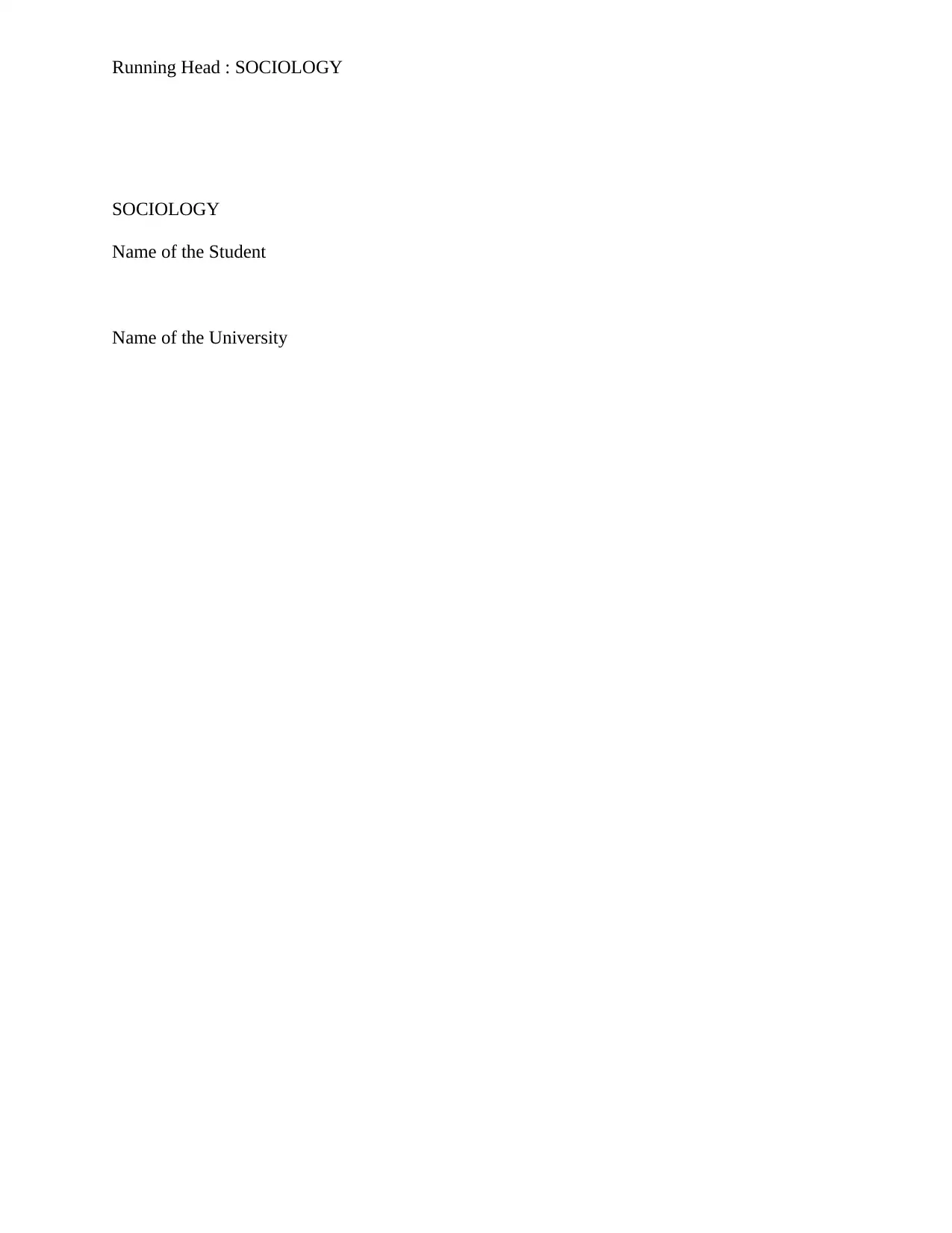
Running Head : SOCIOLOGY
SOCIOLOGY
Name of the Student
Name of the University
SOCIOLOGY
Name of the Student
Name of the University
Paraphrase This Document
Need a fresh take? Get an instant paraphrase of this document with our AI Paraphraser
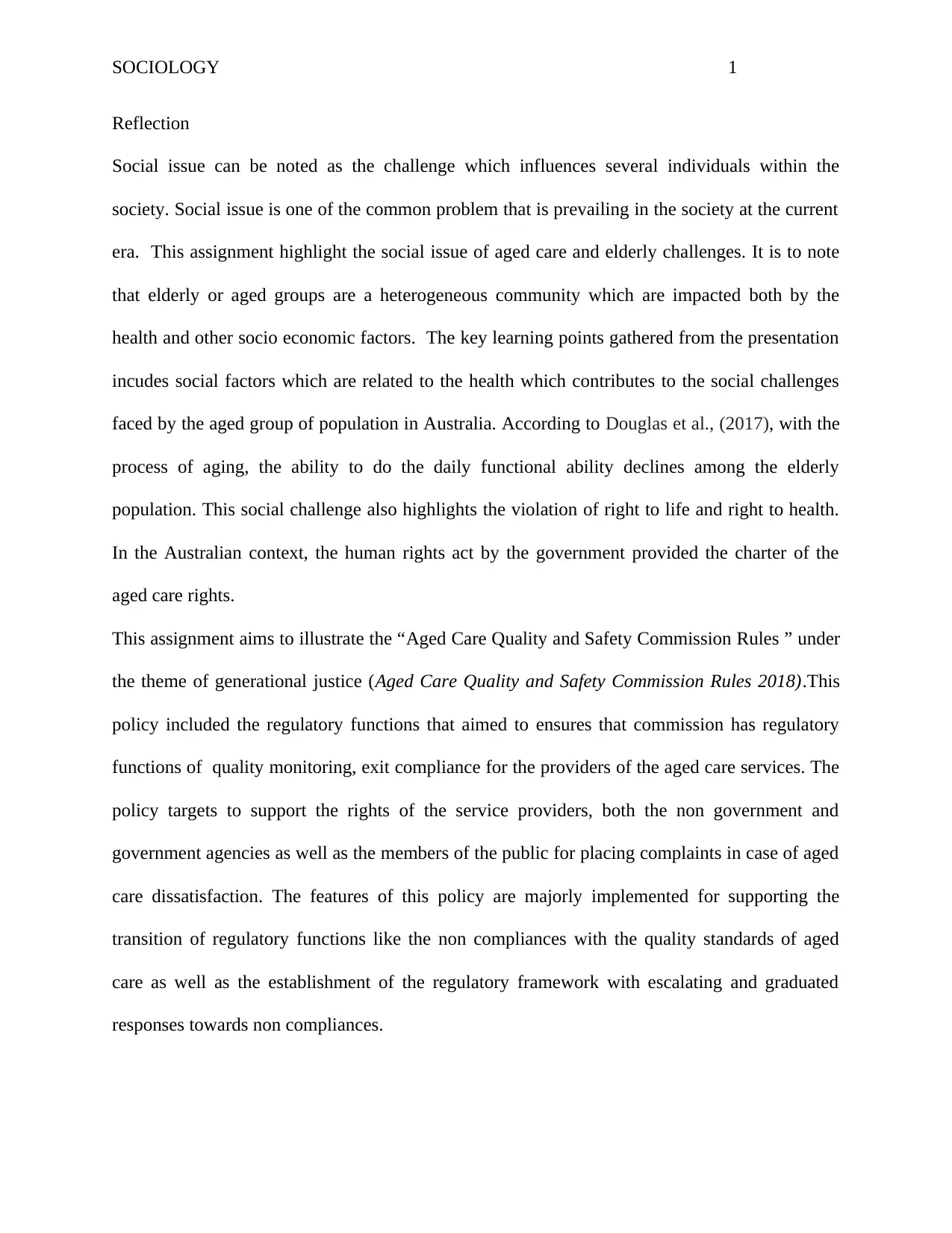
SOCIOLOGY 1
Reflection
Social issue can be noted as the challenge which influences several individuals within the
society. Social issue is one of the common problem that is prevailing in the society at the current
era. This assignment highlight the social issue of aged care and elderly challenges. It is to note
that elderly or aged groups are a heterogeneous community which are impacted both by the
health and other socio economic factors. The key learning points gathered from the presentation
incudes social factors which are related to the health which contributes to the social challenges
faced by the aged group of population in Australia. According to Douglas et al., (2017), with the
process of aging, the ability to do the daily functional ability declines among the elderly
population. This social challenge also highlights the violation of right to life and right to health.
In the Australian context, the human rights act by the government provided the charter of the
aged care rights.
This assignment aims to illustrate the “Aged Care Quality and Safety Commission Rules ” under
the theme of generational justice (Aged Care Quality and Safety Commission Rules 2018).This
policy included the regulatory functions that aimed to ensures that commission has regulatory
functions of quality monitoring, exit compliance for the providers of the aged care services. The
policy targets to support the rights of the service providers, both the non government and
government agencies as well as the members of the public for placing complaints in case of aged
care dissatisfaction. The features of this policy are majorly implemented for supporting the
transition of regulatory functions like the non compliances with the quality standards of aged
care as well as the establishment of the regulatory framework with escalating and graduated
responses towards non compliances.
Reflection
Social issue can be noted as the challenge which influences several individuals within the
society. Social issue is one of the common problem that is prevailing in the society at the current
era. This assignment highlight the social issue of aged care and elderly challenges. It is to note
that elderly or aged groups are a heterogeneous community which are impacted both by the
health and other socio economic factors. The key learning points gathered from the presentation
incudes social factors which are related to the health which contributes to the social challenges
faced by the aged group of population in Australia. According to Douglas et al., (2017), with the
process of aging, the ability to do the daily functional ability declines among the elderly
population. This social challenge also highlights the violation of right to life and right to health.
In the Australian context, the human rights act by the government provided the charter of the
aged care rights.
This assignment aims to illustrate the “Aged Care Quality and Safety Commission Rules ” under
the theme of generational justice (Aged Care Quality and Safety Commission Rules 2018).This
policy included the regulatory functions that aimed to ensures that commission has regulatory
functions of quality monitoring, exit compliance for the providers of the aged care services. The
policy targets to support the rights of the service providers, both the non government and
government agencies as well as the members of the public for placing complaints in case of aged
care dissatisfaction. The features of this policy are majorly implemented for supporting the
transition of regulatory functions like the non compliances with the quality standards of aged
care as well as the establishment of the regulatory framework with escalating and graduated
responses towards non compliances.
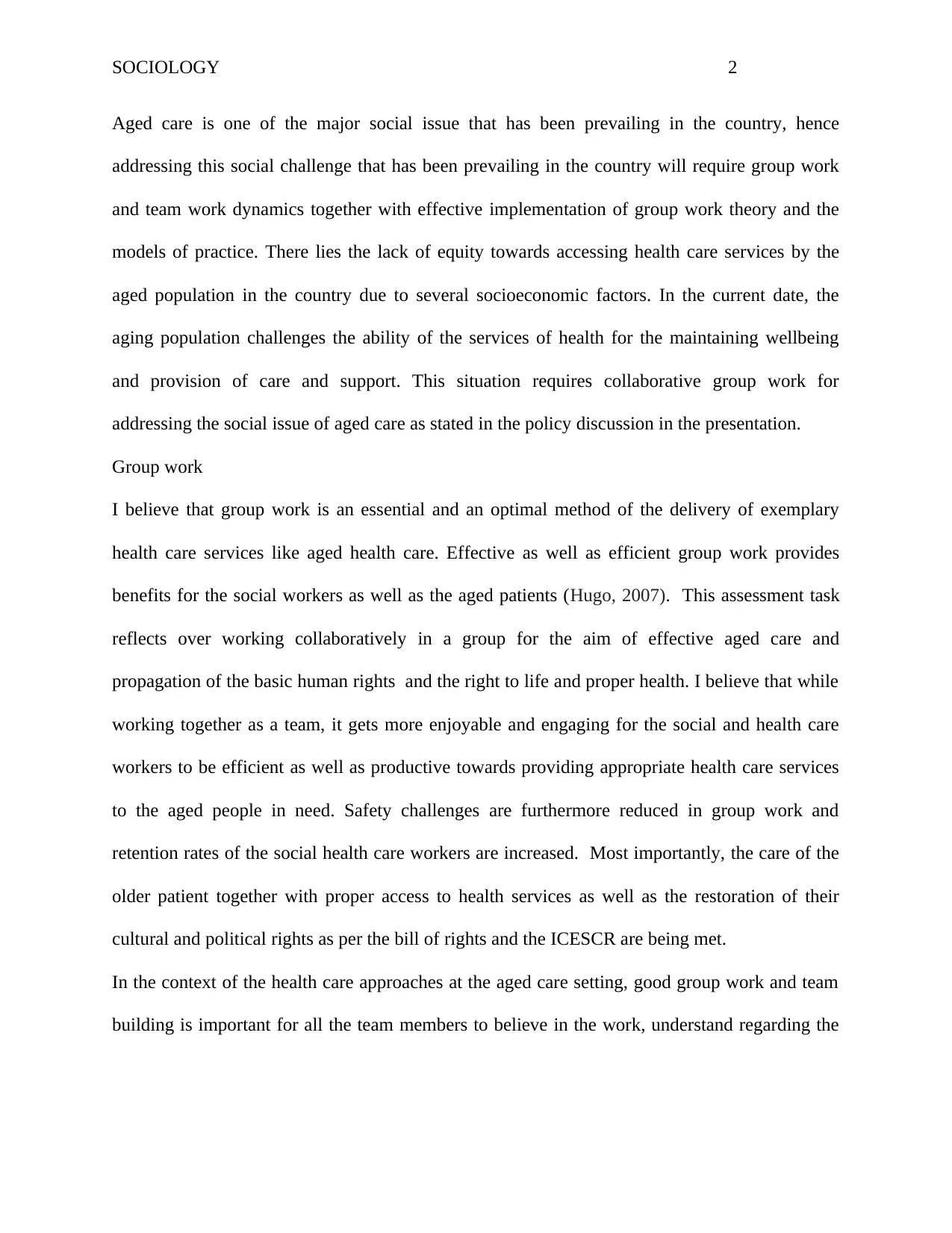
SOCIOLOGY 2
Aged care is one of the major social issue that has been prevailing in the country, hence
addressing this social challenge that has been prevailing in the country will require group work
and team work dynamics together with effective implementation of group work theory and the
models of practice. There lies the lack of equity towards accessing health care services by the
aged population in the country due to several socioeconomic factors. In the current date, the
aging population challenges the ability of the services of health for the maintaining wellbeing
and provision of care and support. This situation requires collaborative group work for
addressing the social issue of aged care as stated in the policy discussion in the presentation.
Group work
I believe that group work is an essential and an optimal method of the delivery of exemplary
health care services like aged health care. Effective as well as efficient group work provides
benefits for the social workers as well as the aged patients (Hugo, 2007). This assessment task
reflects over working collaboratively in a group for the aim of effective aged care and
propagation of the basic human rights and the right to life and proper health. I believe that while
working together as a team, it gets more enjoyable and engaging for the social and health care
workers to be efficient as well as productive towards providing appropriate health care services
to the aged people in need. Safety challenges are furthermore reduced in group work and
retention rates of the social health care workers are increased. Most importantly, the care of the
older patient together with proper access to health services as well as the restoration of their
cultural and political rights as per the bill of rights and the ICESCR are being met.
In the context of the health care approaches at the aged care setting, good group work and team
building is important for all the team members to believe in the work, understand regarding the
Aged care is one of the major social issue that has been prevailing in the country, hence
addressing this social challenge that has been prevailing in the country will require group work
and team work dynamics together with effective implementation of group work theory and the
models of practice. There lies the lack of equity towards accessing health care services by the
aged population in the country due to several socioeconomic factors. In the current date, the
aging population challenges the ability of the services of health for the maintaining wellbeing
and provision of care and support. This situation requires collaborative group work for
addressing the social issue of aged care as stated in the policy discussion in the presentation.
Group work
I believe that group work is an essential and an optimal method of the delivery of exemplary
health care services like aged health care. Effective as well as efficient group work provides
benefits for the social workers as well as the aged patients (Hugo, 2007). This assessment task
reflects over working collaboratively in a group for the aim of effective aged care and
propagation of the basic human rights and the right to life and proper health. I believe that while
working together as a team, it gets more enjoyable and engaging for the social and health care
workers to be efficient as well as productive towards providing appropriate health care services
to the aged people in need. Safety challenges are furthermore reduced in group work and
retention rates of the social health care workers are increased. Most importantly, the care of the
older patient together with proper access to health services as well as the restoration of their
cultural and political rights as per the bill of rights and the ICESCR are being met.
In the context of the health care approaches at the aged care setting, good group work and team
building is important for all the team members to believe in the work, understand regarding the
⊘ This is a preview!⊘
Do you want full access?
Subscribe today to unlock all pages.

Trusted by 1+ million students worldwide
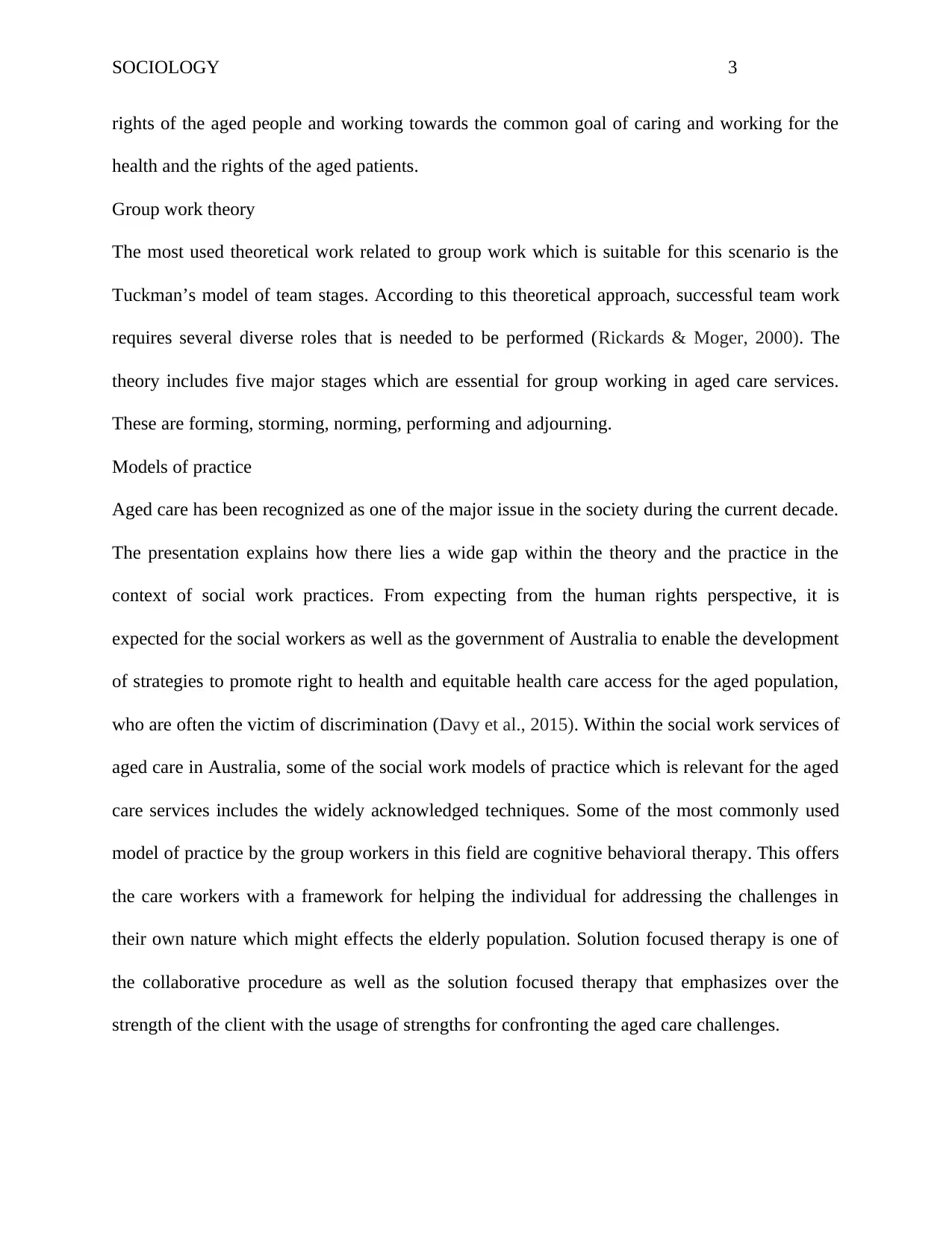
SOCIOLOGY 3
rights of the aged people and working towards the common goal of caring and working for the
health and the rights of the aged patients.
Group work theory
The most used theoretical work related to group work which is suitable for this scenario is the
Tuckman’s model of team stages. According to this theoretical approach, successful team work
requires several diverse roles that is needed to be performed (Rickards & Moger, 2000). The
theory includes five major stages which are essential for group working in aged care services.
These are forming, storming, norming, performing and adjourning.
Models of practice
Aged care has been recognized as one of the major issue in the society during the current decade.
The presentation explains how there lies a wide gap within the theory and the practice in the
context of social work practices. From expecting from the human rights perspective, it is
expected for the social workers as well as the government of Australia to enable the development
of strategies to promote right to health and equitable health care access for the aged population,
who are often the victim of discrimination (Davy et al., 2015). Within the social work services of
aged care in Australia, some of the social work models of practice which is relevant for the aged
care services includes the widely acknowledged techniques. Some of the most commonly used
model of practice by the group workers in this field are cognitive behavioral therapy. This offers
the care workers with a framework for helping the individual for addressing the challenges in
their own nature which might effects the elderly population. Solution focused therapy is one of
the collaborative procedure as well as the solution focused therapy that emphasizes over the
strength of the client with the usage of strengths for confronting the aged care challenges.
rights of the aged people and working towards the common goal of caring and working for the
health and the rights of the aged patients.
Group work theory
The most used theoretical work related to group work which is suitable for this scenario is the
Tuckman’s model of team stages. According to this theoretical approach, successful team work
requires several diverse roles that is needed to be performed (Rickards & Moger, 2000). The
theory includes five major stages which are essential for group working in aged care services.
These are forming, storming, norming, performing and adjourning.
Models of practice
Aged care has been recognized as one of the major issue in the society during the current decade.
The presentation explains how there lies a wide gap within the theory and the practice in the
context of social work practices. From expecting from the human rights perspective, it is
expected for the social workers as well as the government of Australia to enable the development
of strategies to promote right to health and equitable health care access for the aged population,
who are often the victim of discrimination (Davy et al., 2015). Within the social work services of
aged care in Australia, some of the social work models of practice which is relevant for the aged
care services includes the widely acknowledged techniques. Some of the most commonly used
model of practice by the group workers in this field are cognitive behavioral therapy. This offers
the care workers with a framework for helping the individual for addressing the challenges in
their own nature which might effects the elderly population. Solution focused therapy is one of
the collaborative procedure as well as the solution focused therapy that emphasizes over the
strength of the client with the usage of strengths for confronting the aged care challenges.
Paraphrase This Document
Need a fresh take? Get an instant paraphrase of this document with our AI Paraphraser
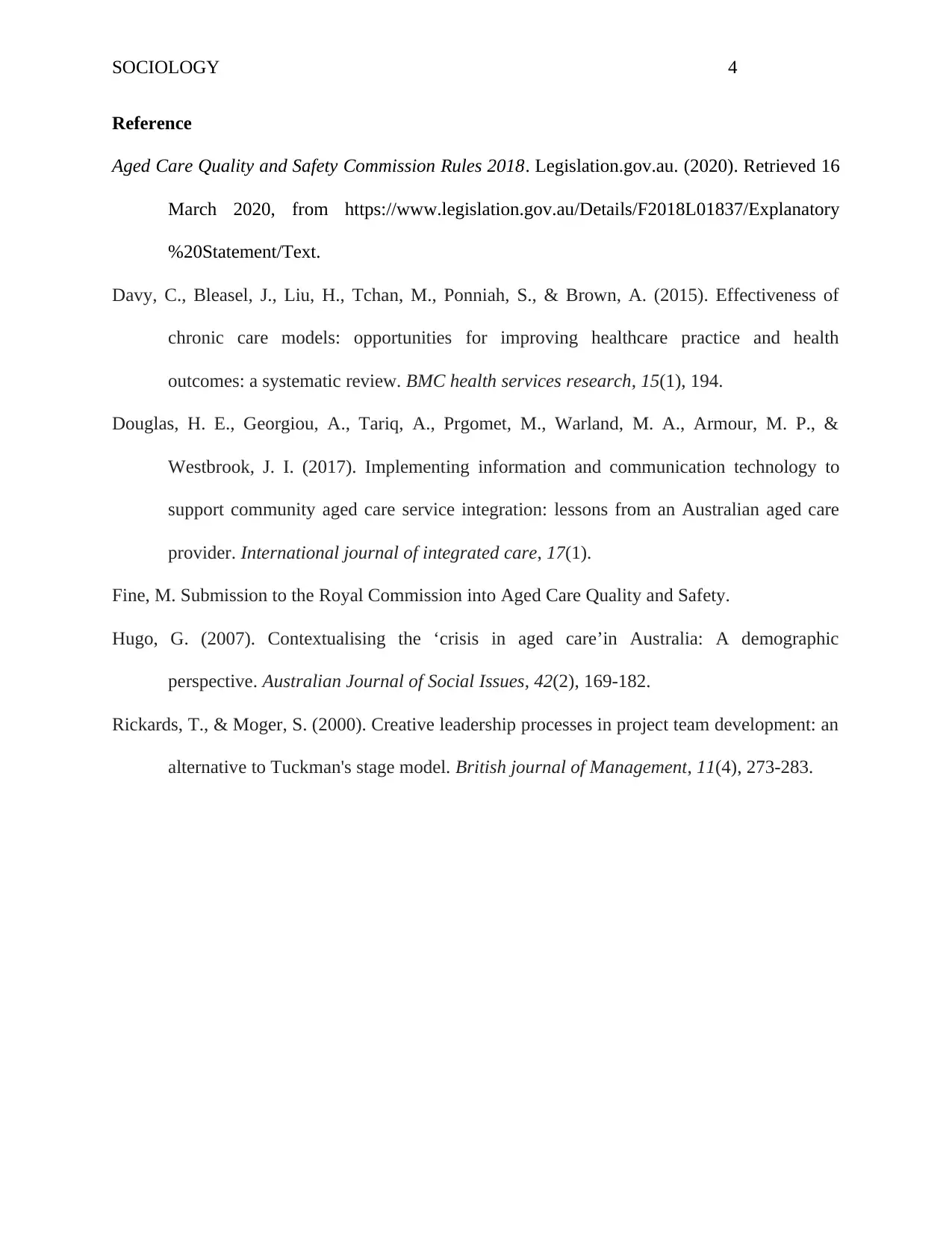
SOCIOLOGY 4
Reference
Aged Care Quality and Safety Commission Rules 2018. Legislation.gov.au. (2020). Retrieved 16
March 2020, from https://www.legislation.gov.au/Details/F2018L01837/Explanatory
%20Statement/Text.
Davy, C., Bleasel, J., Liu, H., Tchan, M., Ponniah, S., & Brown, A. (2015). Effectiveness of
chronic care models: opportunities for improving healthcare practice and health
outcomes: a systematic review. BMC health services research, 15(1), 194.
Douglas, H. E., Georgiou, A., Tariq, A., Prgomet, M., Warland, M. A., Armour, M. P., &
Westbrook, J. I. (2017). Implementing information and communication technology to
support community aged care service integration: lessons from an Australian aged care
provider. International journal of integrated care, 17(1).
Fine, M. Submission to the Royal Commission into Aged Care Quality and Safety.
Hugo, G. (2007). Contextualising the ‘crisis in aged care’in Australia: A demographic
perspective. Australian Journal of Social Issues, 42(2), 169-182.
Rickards, T., & Moger, S. (2000). Creative leadership processes in project team development: an
alternative to Tuckman's stage model. British journal of Management, 11(4), 273-283.
Reference
Aged Care Quality and Safety Commission Rules 2018. Legislation.gov.au. (2020). Retrieved 16
March 2020, from https://www.legislation.gov.au/Details/F2018L01837/Explanatory
%20Statement/Text.
Davy, C., Bleasel, J., Liu, H., Tchan, M., Ponniah, S., & Brown, A. (2015). Effectiveness of
chronic care models: opportunities for improving healthcare practice and health
outcomes: a systematic review. BMC health services research, 15(1), 194.
Douglas, H. E., Georgiou, A., Tariq, A., Prgomet, M., Warland, M. A., Armour, M. P., &
Westbrook, J. I. (2017). Implementing information and communication technology to
support community aged care service integration: lessons from an Australian aged care
provider. International journal of integrated care, 17(1).
Fine, M. Submission to the Royal Commission into Aged Care Quality and Safety.
Hugo, G. (2007). Contextualising the ‘crisis in aged care’in Australia: A demographic
perspective. Australian Journal of Social Issues, 42(2), 169-182.
Rickards, T., & Moger, S. (2000). Creative leadership processes in project team development: an
alternative to Tuckman's stage model. British journal of Management, 11(4), 273-283.
1 out of 5
Related Documents
Your All-in-One AI-Powered Toolkit for Academic Success.
+13062052269
info@desklib.com
Available 24*7 on WhatsApp / Email
![[object Object]](/_next/static/media/star-bottom.7253800d.svg)
Unlock your academic potential
Copyright © 2020–2026 A2Z Services. All Rights Reserved. Developed and managed by ZUCOL.





